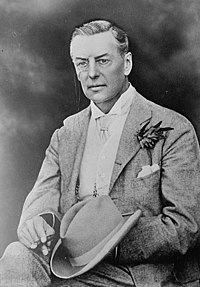Water privatisation in England and Wales
Margaret Thatcher's Conservative government, which had been elected in 1979, had curtailed the RWAs' ability to borrow money they deemed necessary for capital projects.
"[9] When the European Union introduced stricter legislation on river, bathing, coastal, and drinking water quality, the sector was in no position to meet the expenditure requirements and the UK was prosecuted for noncompliance.
[12][b] Estimates of the capital expenditure required to achieve EU standards and meet the existing backlog in infrastructure maintenance ranged from £24 to £30 billion.
At the same time, the government assumed responsibility for the sector's total debts amounting to £5 billion and granted the WSCs a further £1.5 billion—a so-called "green dowry"—of public funds.
[17] Campaigners alleged that there was a cover-up of the 1988 Camelford water pollution incident because prosecution would have had a negative effect on the privatisation process.
A contemporary confidential memo—later obtained under the Freedom of Information Act—from a senior civil servant to the then Minister of State for the Environment, Michael Howard, warned: "Those of the South West Board with a commercial background are deeply concerned by the investigation.
"[21] In March 2012, delivering a narrative verdict on the death of Camelford resident Carole Cross, Michael Rose, the Coroner for West Somerset, stated that he harboured the "deepest suspicion" that the true nature of the 1988 disaster was "not revealed immediately because the water industry was being privatised," adding that there was a "deliberate policy not to advise the public of the true nature [of the disaster] until some 16 days after the occurrence of the incident.

